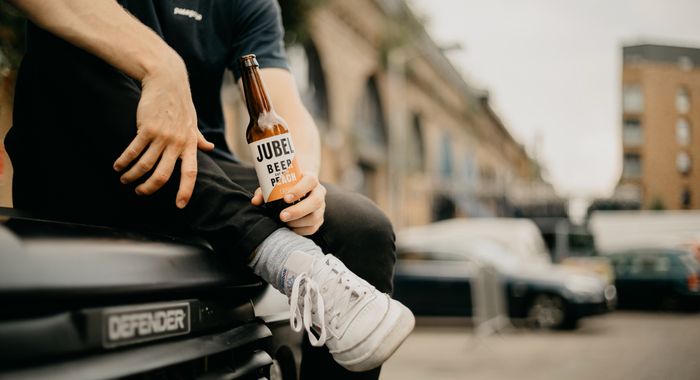It’s immediately obvious you’re looking at a labour of love when you see an Otter Surfboard. They’d be a beautiful decoration in your house, but that's not really the point. Stepping into the workshop you’re greeted by the amazing smell of the wood and the patting paws from Buddy, the workshop dog. Despite it’s bare appearance it feels welcoming and almost homely and James Otter the founder of the company is a large part in that. On a sunny afternoon James was kind enough to sit down and chat to me about business, life and all things between.
“I grew up just outside London but fell in love with Cornwall on holidays as a kid. I wanted to be down this way by the sea so I came and studied designing and making at Plymouth University. It wasn’t specific to wood and there were ceramics workshops, metalwork projects and so on but I’ve always been drawn back to making with wood. I saw a magazine article about wooden surfboards and that was it really, I thought why not give it a go?”
“It made sense, if I can make a wooden board, it’s likely to last longer and I know where the materials have come from. I was just fed up with the way that foam boards fell apart so often. The wooden core we use is much stronger than foam so they don’t get the compression dings that foam boards do. We’ve had ones where you can pretty much scrape the wax off and they are the same after 5 years. Obviously you do still have to look after them but they last well.”
“They are still finished with a resin and fiberglass but because of the strength of the wood we can use about a third the amount a normal board uses. The resin we use is a bio-resin is 50/60 percent non virgin oils which is heading in the right direction to reducing its impact but is still the nastiest part of the making process. As with everything's that's made longevity goes a huge way to reducing impact on the environment, so we just have to keep our finger on the pulse for new methods of making. Surfboard technologies borrows from aerospace and motorsport industries I guess but realistically the industry standard has been the same since the 60’s. Polyurethane foam and polyester resin, that is still the standard but it's become more accepted/popular to have expanded polystyrene which you can then recycle but it tends to not be as good quality.
We always though the longboards would be the most popular ones because that's iconically the place and culture we would like to put ourselves in. The fact they’re made of wood makes the around 30 percent heavier so they lend themselves to the surfing styles that are smoother and about gliding/rail to rail work. It’s a really different feel to surfing fiberglass boards, they have an incredible momentum to them, it’s like having speed for free.”
“The industry is always toying with cost vs creating the best product and ultimately foam suits the manufacturers because they know the boards don’t last and people will be coming back. My passion for the planet came from a love of the woodland. When you’re in the water and on the beach it’s a very close connection to nature and you really see the impacts you’re having.
We have a very close connection to the wood we source. The woodland management system our source uses is called constant cover where there's no single species and instead is all mixed. The woods naturally regenerate rather than having to go in and plant and his yield is similar to commercial woodland. It takes more effort on the management side but we think it's better for the natural habitat. Actually knowing your with someone who cares about the land makes a real difference to me.”
“We get a real mixture of customers, some are die-hard surfers whilst some just love making things and the idea of having their own board they made with their own hands is a big enough draw. Everyone comes with their own story, the surfing's almost just a hook to persuade people to get hands on again with a week in a workshop. The diversity of customers can be a blessing and a curse and it’s hard to target an audience to promote our work to, but it's something we are working on.
For us growth looks like similar numbers but better experiences for the people that come to us. I find it difficult to sell product so for me it’s as much about the experience they have as the board they leave with. The process is such a roller-coaster of emotions and people’s dreams are in these boards so it’s a relief when you get through to the end of Friday. But that’s what makes the process so special. Because the workshops are intense and emotional we often form a real connection with the people we have over the week. Up until Monday people are often just a name of an email but when Friday comes they can be lifelong friends so we run an annual gathering every year when we invite everyone back for food/surfing which is always an amazing time.”

